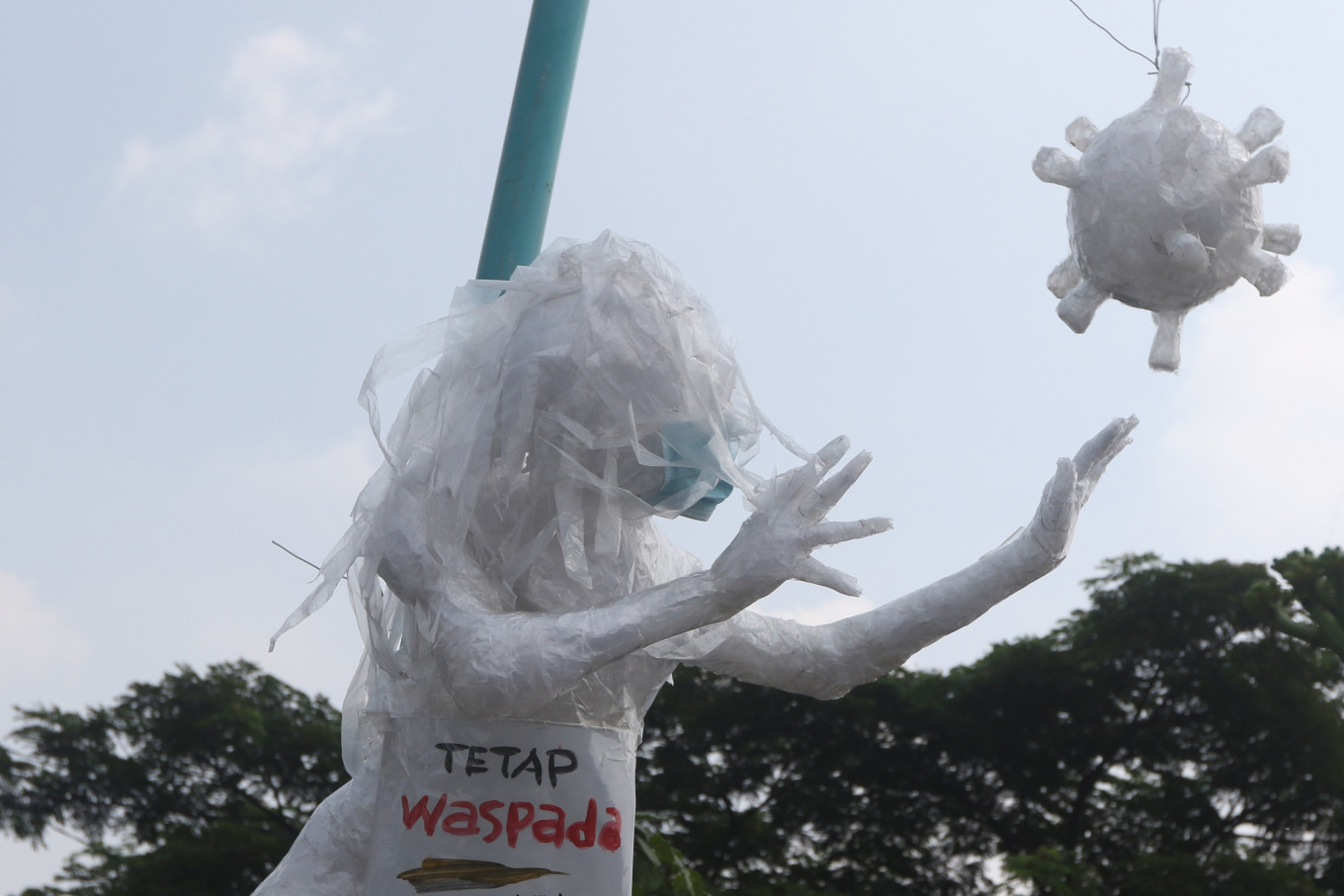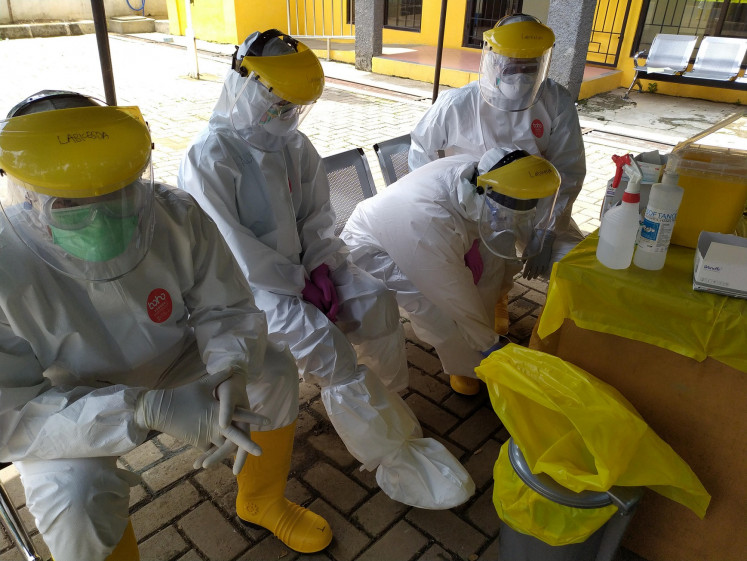Popular Reads
Top Results
Can't find what you're looking for?
View all search resultsPopular Reads
Top Results
Can't find what you're looking for?
View all search resultsCOVID-19 monitoring groups want govt to adopt best practices
Low public trust in the capability of the Indonesian government in handling the pandemic was partly caused by an influx of false information.
Change text size
Gift Premium Articles
to Anyone
L
ow public trust in the capability of the Indonesian government in handling the global pandemic was partly caused by an influx of false information.
Hoaxes and half-truths spread just as fast as the coronavirus, according to independent monitoring groups.
“The misinformation that caused public panic and confusion could be overcome by information from the authority. The government should act as the sole authority for the dissemination of information,” said Elina Ciptadi of KawalCOVID19.id.
“The government should provide routine, thorough and accurate information and it has to be delivered as quickly as possible, complying with the World Health Organization [WHO] standard of transparent, reliable and timely health information,” she said.
The front page of the Kawalcovid19.id website. (Kawalcovid19.id/-)The Singapore-based mass communications practitioner was among the pro-data activists who worked independently as a group to discern information during past elections.
KawalCOVID19.id existed on various social media platforms including Twitter and Facebook. The group includes Indonesian diaspora in countries affected early by the virus outbreak.
The members come from various professions, such as medical practitioners, virologists, epidemiologists, medical researchers, medical and life science analysts, as well as communications specialists living in Singapore, Taiwan, South Korea, Australia, Italy and the UK.
The members started the data monitoring after the initial outbreak in Wuhan, China, last year, on both the spread of the virus and hoaxes, before creating their social media accounts one day before the Indonesian government announced the country's first two cases of COVID-19.
“Learning from how it spread, at that time we thought that at some point it would arrive in Indonesia. It was only a matter of time and how severe it would be,” said Elina.
Within the first 24 hours its Twitter account got 32,000 followers, and now the number has tripled.
“The number shows that people are looking for reliable information and we want to be the bridge for this information gap,” she added.
The lagging response from the Indonesian government and the media concerning the outbreak long before the global health authority announced it as a pandemic triggered Alif Nurlambang to start Spektator.id on Feb. 26, a blog site dedicated to disseminating insights and information on various policies practiced by other countries in coping with the pandemic.
As one of the personnel assigned to Sierra Leone in 2014 and 2015 to curb the spread of the Ebola virus under the Geneva-based Federation of Red Cross and Red Crescent Societies (IFRC), Alif shared his knowledge on how countries were dealing with the outbreak.
Wait and see: Medical officers take a short break during a rapid COVID-19 test at the Depok City Regional Health Laboratory in Depok, West Java, on Monday, April 13. (JP/P.J. Leo)Some posts on the blog described the paramount importance of the media choosing their news sources wisely and having basic knowledge about the issue.
“Many statements made by the government were left unpursued, while the officials have to be aware that some media outlets tend to publish misleading headlines,” said Alif.
“There should be a consolidation of the issue in which the authority gives a clear explanation of each policy it makes and gives a clear order of what it expects from the people. There are some best practices implemented by other countries that the government could adopt.”
Methodical contact tracing, aggressive testing and the wide decentralization of laboratories authorized for the testing were among the policies he said proved effective to curb the pandemic.
“The deployment of the State Intelligence Agency [BIN] for contact tracing or data collecting only shows that the government treated it as a clandestine mission that could not be revealed to the public, while WHO-standard procedure for the country task force said that it must be a community effort,” Alif said.
“This pandemic is not a subversion case, it's a public health issue and the public need to know the risk of being in a certain place at a certain time,”
“For data collecting, the government could deploy the volunteers from the Indonesian Red Cross as they have been trained for that – even to find separated family members during natural disasters.”
He also pointed out the importance of a safe and dignified burial protocol, especially in religious, tight-knit communities in villages.
“Unlike in urban cities, how people in villages would respond to emergency burial may be different. From my experience in Sierra Leone, the villagers insisted on holding religious rituals for a religious leader who died of Ebola. They sprayed the water used to wash the deceased and the next day all three villages were quarantined as they all tested positive.”
The monitoring groups also voiced concerns about the influx of information on the various rapid test kits available in the online market as well as the testing method used by the government.
“The Health Ministry and the referral hospitals should give clear information on the testing method and procedure to avoid public confusion,” said Elina.
Epidemiologist Bayu Satria of KawalCOVID19.id, currently pursuing a doctoral degree in Taiwan, said the best quick response for Indonesia was to obtain mobile COVID-19 test kits with high sensitivity on a par with the polymerase chain reaction (PCR) method that used DNA samples to detect the virus.
“The rapid antibody test using blood samples is not as sensitive or specific so the result still has to be re-confirmed with the PCR test at referral labs. And it takes time,” he said.
“It’s better for the government to obtain rapid PCR test kits similar to the ones used in South Korea or widen the lab network equipped with the facility to detect the virus.”
The mass or aggressive testing as implemented in South Korea has proved effective in stemming the spread of the virus. Such policy, according to Bayu, was not used in Taiwan as the country had set up an early detection system.
“The government here has a reliable contact tracing method and isolation management. As the country has rushed to set up the health management system, it could provide quick response so the coronavirus did not spread within communities unlike in Indonesia,” he added.
Alif acknowledged that unlike other countries that had been affected by previous health crises such as the coronavirus-induced SARS and MERS outbreaks, Indonesia has no experience nor the protocol for health crisis management other than for common respiratory illnesses with many doctors trained for epidemic control.
“We are steps behind other countries. The government should take this as a chance to change people's behavior and their concern about personal hygiene,” he said.
“If there is a silver lining, the pandemic is perhaps a golden opportunity for the government to create a reliable public health system.”













